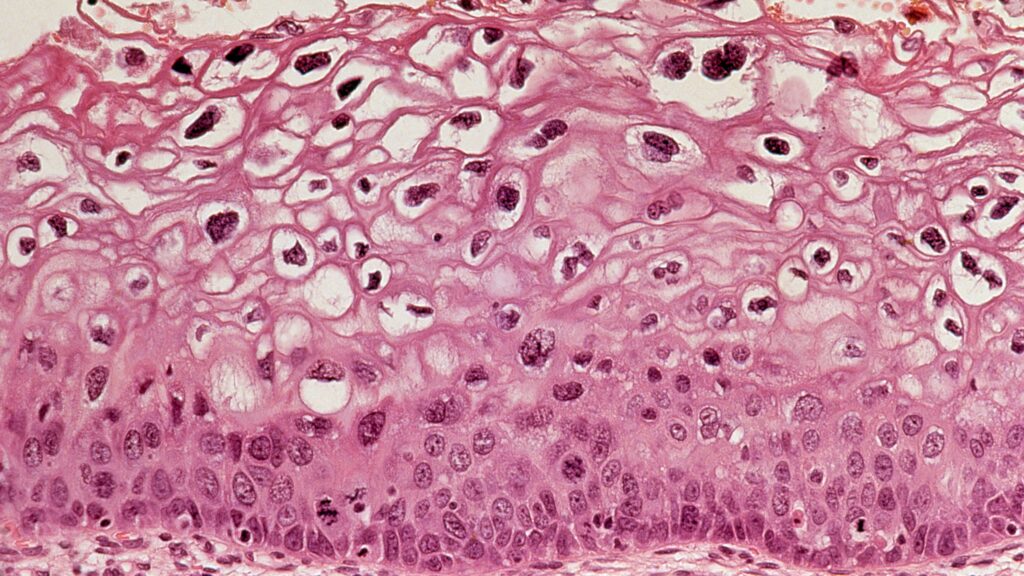You’d think if there were a vaccine that would prevent tens of thousands of cases of cancer a year, people would want it for themselves and for their kids.
But new data being released Thursday ahead of the annual meeting of the American Society of Clinical Oncology show that just isn’t the case.
advertisement
The data showed that the vaccine reduced the risk of HPV-related cancers by 56% in men and 36% in women — numbers that actually probably understate the efficacy of the vaccine because participants in this observational study likely got the vaccine too late to prevent all HPV infections. The data were analyzed by researchers led by Jefferson DeKloe, a research fellow at Thomas Jefferson University.
That shouldn’t really be news. It’s been clear since the main HPV vaccine, Gardasil, was first introduced by Merck in 2006 that it decreases the risk of both human papillomavirus infection and the precancerous lesions it causes in the cervix.
But in 1999, a researcher named Maura Gillison found that the vaccine might have another benefit. She was one of the first to document that throat cancer in men, like cervical cancer in women, was likely caused by HPV, which is usually sexually transmitted.
advertisement
Data were much slower to emerge about how well the vaccine worked at preventing throat cancer, but such cancers have turned out to be a big problem. The Centers for Disease Control and Prevention estimate that about 37,000 cancers are caused by HPV annually. Of these, 12,500 are oropharyngeal cancers in men and 10,500 are cancers of the cervix. More rarely, the virus causes cancers of the anus, penis, vagina, and vulva.
The data being presented at ASCO are based on the rates of HPV in a giant database of electronic health records from 90 million patients collected by TriNetX, a private company in the business of using such data to conduct observational studies. The researchers were able to compare roughly 1.7 million patients vaccinated for HPV with roughly the same number of age-matched control patients with no prior HPV vaccination. A total of 56% were female, 53% were white, 21% were Black/African American, with a mix of people of other backgrounds represented.
There are problems with this setup that actually make it tougher for the vaccine. For instance, some patients who had cervical lesions were known to get the vaccine after the lesions had shown up, and people might be getting the vaccine after they had already been infected with HPV, which takes many, many years to cause cancer. It’s also possible that some people who were included in the control group somehow got the vaccine and it wasn’t recorded, which would make the vaccine appear less effective.
Still, the results were dramatic. Vaccinated males had 3.4 cases of HPV-linked cancer per 100,000 patients compared to 7.5 per 100,000 unvaccinated patients. Vaccinated females had 11.5 cases per 100,000 patients compared to 15.8 per 100,000 unvaccinated patients.
We know from other studies that the vaccine can be far more effective than that when given when women are young. A recent study in Scotland found that no cases of cervical cancer were found in women who were vaccinated before they were 14 years old.
But another study being presented at ASCO found that rates of HPV vaccination in adolescents and young adults in the U.S. improved from 7.8% to 36.4% of males and from 37.7% to 49.4% of females between 2011 and March 2020 — meaning most people are still not being vaccinated.
There are many reasons for this, including the rising wave of vaccine skepticism and hesitancy that was present in the U.S. even before the Covid-19 pandemic. But it’s a shame.
Merck did its fair share of inadvisable political jockeying when it came to launching Gardasil, and it has certainly reaped profits from selling the vaccine; sales grew 29% to $8.9 billion last year. But the story of the vaccine was also the story of a researcher, Kathrin Jansen, who pushed the vaccine through despite internal skepticism at the drugmaker. She’d later run Pfizer’s vaccine effort during the pandemic.
There is not really any debate, at this point, that this vaccine would prevent tens of thousands of cases of cancer a year if it were used more widely. It’s a miraculous product, and we should be using it.

